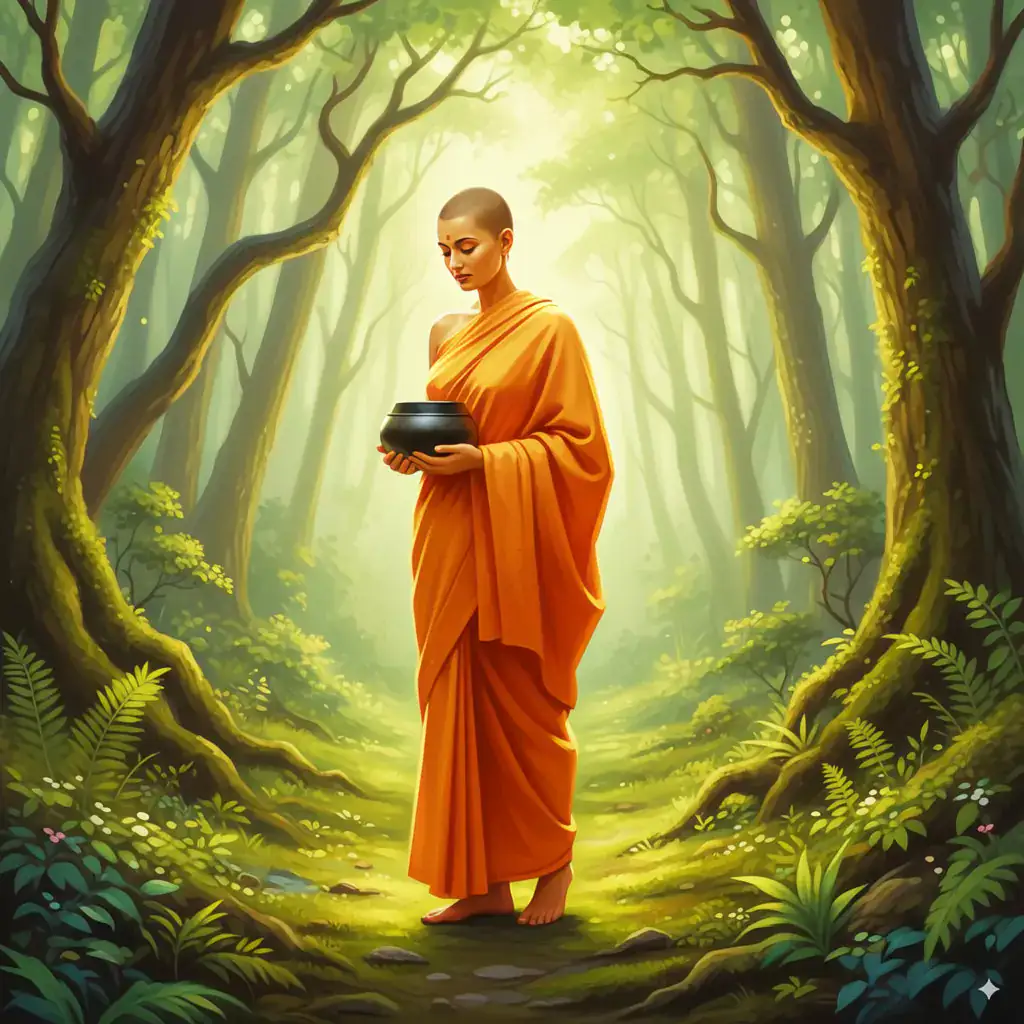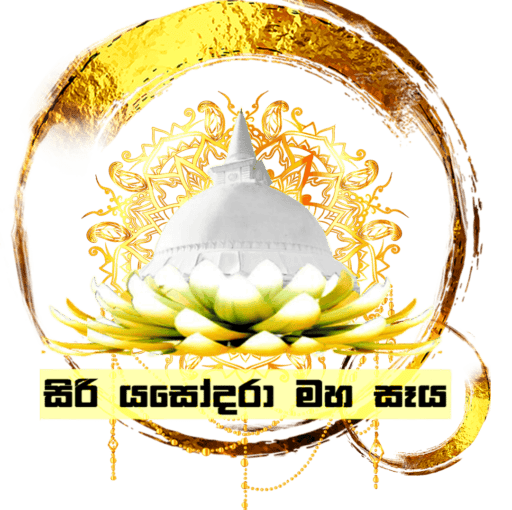
-
Save
Yashodhara Theri: The Journey to Arahantship - Part 2
When Prince Rāhula became a monk, Yaśodharā once again sought permission from King Suddhodana to enter the order. The king replied:
“Daughter, if you were to ordain now, people in the future might condemn it, saying that you became a nun merely out of sorrow at losing your only son.Do you not remember that even when you lost your beloved Jāliya and Kanhajinā, you bore that pain and endured the grief? The occasions on which you have had to give away your children—born of your own womb, with their little hands bound together—are more numerous than the very mountain Sineru. Yet even then, you endured the suffering and sorrow.
Now, when my son, Prince Siddhārtha, has attained Enlightenment and ordained his only son, how can we resist the destiny that has unfolded? First, I was overcome by Siddhārtha, then by Nanda, and now by my little grandson Rāhula. How can I lose you as well?”
“Besides, this is not the right time for you to be ordained. Be patient; your ordination will take place at the proper time.”
A few years later, King Suddhodana, having attained Arahantship, passed into the final bliss of Nibbāna while lying under the white parasol in his chamber. By then, Mother Gotamī had become alone. One day, she addressed Yaśodarā—who had repeatedly requested permission to ordain—and said:
“Listen, my beloved daughter, when my son was in the palace, your immeasurable love and respect made it so that you could not even look directly at his face. Nor could you speak more than two or three words to him. You were extremely shy. So how can you now ask for ordination in the presence of the Enlightened One? If you showed such deep respect and honor when he was merely a prince, how could you now request monasticism before the Lord Buddha?
Even though I asked three times for women’s ordination, the Buddha refused. If you were to ask now, people might think that the Buddha has specially treated his wife in lay life and is now granting her ordination as a favor. That thought would never lead to good.
So, my daughter, be patient for a moment. I will go first and request ordination in the presence of the Enlightened One. When I am ordained, you may then come and ask for ordination.”
Thus, Yaśodarā had to wait at the palace, while Mother Gotamī, accompanied by five hundred high-born Sākyan women, traveled to Viśālā to seek ordination in the Buddha’s dispensation. With the acceptance of the “Eight Special Conditions” (Aṣṭha Garu Dhamma) in the presence of the Lord Buddha, Mahā Prajāpatī Gotamī received higher ordination and thereby established the Bhikkhunī Saṅgha—the order of nuns—in the dispensation of Gotama Buddha.
With the renunciation of Mother Prajāpatī, Yaśodarā was left alone in the palace. After the great renunciation of our Bodhisatta, all his possessions—including the three beautiful palaces named Ramya, Suramya, and Subhā, along with their dancers and attendants—belonged to Yaśodarā. Then, with the renunciation of Mother Gotamī, the entirety of King Suddhodana’s royal possessions and powers, the glory of Queen Mahāmāyā and Queen Prajāpatī Gotamī, the estates of Prince Nanda and Prince Rāhula, and even the wealth of her brother Devadatta, came under her care. Like rivers flowing toward the ocean, all the wealth and glory of the Shākyans in Kapilavattu and the Koliyans in Devdaha gathered before Yaśodarā. Yet she remained unmoved. None of this wealth or luxury could sway her heart. Instead of indulging in sensual pleasures, her heart was firmly set on renunciation and the path of a nun.
It is no surprise that she refused such vast wealth. Yaśodarā had already practiced relinquishing abundant treasures in saṁsāra—not only material riches but also the precious wealth of children, husbands, and even her own life—for countless eons. She did so without hesitation, without aversion, without regret, and with a heart overflowing with loving-kindness and equanimity.
She left behind all her possessions as one might cast away the carcass of a snake tied around their neck and made her final decision to seek liberation. Accompanied by a thousand noblewomen of Shākyan lineage, she shaved her head, donned saffron robes, took clay bowls in hand, and set out on foot from the great Shākyan palace in Kapilavattu to meet the “Giver of Liberation,” the Lord Buddha.

-
Save
When it became known that Yaśodarā and the thousand Shākyan ladies were renouncing worldly pleasures to seek the bliss of liberation, millions from the Shākyan and Koliyan clans rushed after them, tearfully protesting. Like the waves of a great ocean, their cries swelled even louder. They ran behind her, weeping. Some came in chariots and palanquins, calling out:
“Oh, our princesses! Let us offer you a ride. Let us carry you in our chariots with these beautiful horses and tuskers. Allow us to serve you in these comfortable palanquins. Let us show our obedience through all these ministrations.”
Others ran with golden bowls and vessels filled with food and drink, pleading:
“Oh, lady of sweet voice and exquisite beauty! Please accept these delicious offerings. Stay with us a while, partake of this food and drink, and rest here for a moment.”
Some broke down in the middle of the road, holding her feet and weeping:
“Oh, princess of all glory! First we lost our ever-so-kind prince Siddhārtha… then our charming Prince Nanda and sweet Rāhula. Oh, princess! Mother Queen Prajāpatī too has left us. How can we console ourselves if you, too, depart? Oh, lady of all glory! Do not leave us; do not abandon us to this misery!”
Along the way from Kapilavattu to Sāvatti, Princess Yaśodarā and the thousand Shākyan princesses were venerated, honored, and deeply respected by both humans and gods. They were offered food and drink, and attendants came to massage their swollen feet with oil and soothing balms. Temporary huts were built for them to rest, roads were cleaned and sprinkled with water for comfort, soft sand was spread along the paths, and guards protected them from thieves, troublemakers, and even ferocious wild animals.
There was nothing extraordinary in these miracles occurring around her; if they had not happened, that alone would have been the true wonder.
When the Bodhisatta gave great alms, Yaśodarā stayed by his side, preparing the offerings and arranging everything meticulously. If the Bodhisatta ran out of items to give, she would offer her own ornaments, jewels, cloths, and belongings in support of his perfection of generosity—never hiding even the smallest thing, not even the size of a mustard seed.
When she was given as a wife or servant to another, she never grew angry nor uttered a curse. Instead, she rejoiced aloud, saying, “Sādu! Sādu! Sādu!” The same equanimity marked her response when her husband gave away her children. When the Bodhisatta practiced austerity, she mirrored him. When he lived in celibacy and seclusion, so did she. When he practiced virtue, she practiced it too. When he renounced worldly life, she maintained chastity and celibacy alongside him.
She lived with a heart entirely free of jealousy and anger, untouched by the defilements of ordinary womanhood.
So, which other woman in this world could be considered more worthy of veneration than Yaśodarā?
Yaśodarā and the thousand Shākyan ladies received ordination from the great Arahant Thērī Mahā Prajāpatī Gotamī, who then brought them to the Blessed One.
“Nun Yaśodarā, Mother of Rāhula, rare is the arising of a Buddha; rare is Enlightenment. Rare is the ‘opportune moment’ (kṣaṇa-sampatti), rare is the sight of a Buddha, rare is birth in the human world, rare is going forth in a Buddha’s dispensation, and rare is listening to the Dhamma. Therefore, be heedful. Walk diligently in this well-established Dhamma and discipline, leaving no delay.”
Therī Yaśodarā accepted the Lord Buddha’s advice with profound respect. Obeying his admonition and dedicating her life to the Great Dhamma, she practiced with unwavering effort. Devoting herself fully to Dhamma and discipline, she diligently cultivated the path. Within two weeks, having eradicated all defilements, cut off all fetters, and extinguished all craving that leads to saṁsāra, Thērī Yaśodarā attained the bliss of Nibbāna and became fully enlightened.
The great Arahant Thērī Yaśodarā, having attained enlightenment, gained the Three Knowledges—the recollection of past lives, the divine eye, and the knowledge of the destruction of the taints. She mastered the Four Analytical Modes (Catvāri Paṭisambhidā), the Eight Deliverances (Aṣṭa Vimokṣa), and the Six Special Knowledges (Chalabiñña). The great Arahant Thērī Yaśodarā thus became renowned as the “foremost among the nuns possessing direct knowledge (abhiññā)” in the dispensation of Gautama Buddha.
Yashodhara Theri: The Journey to Arahantship – PART : 03
